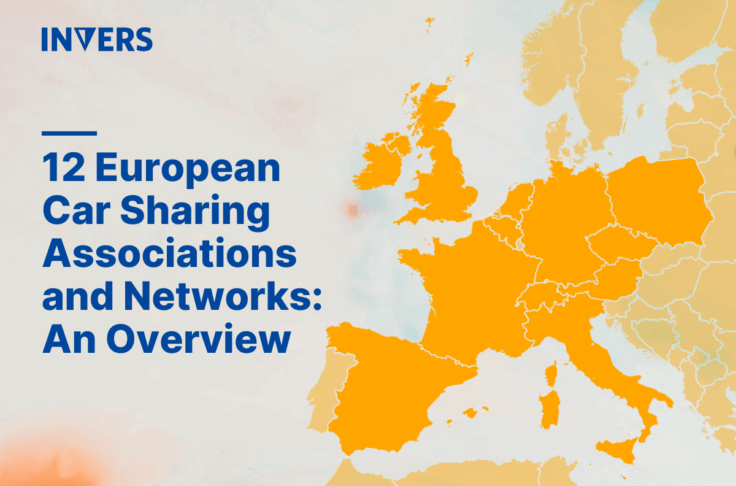The Next Frontier for Car Rental Companies is Sharing Cars
Summary
Car rental companies have the opportunity for a small pivot to embrace the growing concept of sharing cars. By having part of the fleet designated for sharing, car rental companies can fill gaps in their customers’ transportation needs. For example, a subset of the fleet can be dedicated to an organization for their own corporate carsharing during the weekdays, and those same vehicles can be offered to gig workers as delivery vehicles. Some companies have already taken small but successful steps in that direction; more are sure to follow.
The car rental industry has proven to be resilient throughout the past few years, weathering global lockdowns, supply chain issues, and changing consumer demands. This is a mature industry that continues to survive recessions and adapt to a changing mobility landscape. Despite the challenges that came with the pandemic, there have been some notable wins and achievements by car rental companies.
Global players are transforming their rental experience
To start, Europcar began offering an interaction-free car rental process that enabled customers to retrieve their own vehicle key to begin the rental. Enterprise also focused on the rental experience by making it easier for customers to extend their rental via the Enterprise app. At the same time, they also partnered with Microsoft to add connected car technology to their fleet, which will provide Enterprise with vehicle data and insights to learn more about their customer behaviour and needs. Meanwhile, Sixt started collaborating with Mobileye in the space of autonomous vehicles with a driverless taxi pilot.
Suffice to say that the car rental industry continues to grow and adapt to the challenges they are currently facing. But right now, these challenges are far from over and how customers rent cars will look different for at least a few more years. Chip shortages, labour shortages, and vehicle shortages are causing people to be creative with their road trip needs, with some even renting U-Hauls for recreational travel. While the demand for car rentals continue to grow, so does the demand for other forms of mobility such as carsharing. In fact, carsharing is going to be the new frontier for the car rental industry.

Adapting to consumer needs: How car rental companies embrace new mobility options
Car rental companies have already realized the importance of adapting to consumer needs, with many embracing new mobility options by investing in a mobility start-up or launching their own shared mobility service. Either way, car rental companies have expanded the scope of their core business to include new mobility options in their service portfolio. When we last looked at this topic, we evaluated how Enterprise, Avis Budget Group, Sixt, and Europcar were actively participating in the technology-enabled space of shared mobility. While growth was slower over the past few years, there are still some notable updates from these car rental companies:
- Enterprise – In addition to the milestones mentioned earlier, Enterprise has managed to sustain current business models such as Enterprise CarShare and CarClub to be a consistent service to its customers.
- Avis Budget Group – Similar to Enterprise, Avis Budget Group continues to maintain the status quo with its involvement in the new mobility space, such as supplying and maintaining vehicles for Lyft and Waymo.
- Sixt – Sixt is getting into the multi-modal space by offering the micromobility service, Tier, within its Sixt share app. This makes it simple for Sixt share users to also view, book, and rent Tier’s e-scooters and e-mopeds.
- Europcar – Europcar announced a partnership with Free2Move to gain more vehicle data through their “Connected Vehicles” program, which will help with improving customer service and improving efficiencies in fleet management. More recently, Volkswagen decided to acquire Europcar back into their portfolio, further broadening their mobility services.
Implementing car sharing for car rental companies
Car rental companies of all sizes can tap into the growing shared mobility market. Compared to mobility start-ups, car rental companies have the advantage of fleet management experience and understanding the ins and outs of fleet operations. While this is often an overlooked aspect of starting a shared mobility service, it’s a critical success factor.
Car rental companies should consider implementing sharing technology into at least a subset of their fleet to take advantage of the benefits that come with sharing. In addition to providing another channel to get the brand in front of customers through a different mobility option, sharing reduces operational risk as well. Offering vehicles up for different use cases will reduce utilization peaks and enable companies to stabilize the demand for vehicles.

Maximizing fleet utilization with the right telematics solution
Similarly, a car made for sharing is a connected car, meaning there will be data collected from the vehicle. Vehicle data can help uncover customer behavior patterns and these insights can be used to enhance the customer experience, which has always been a focus for car rental companies. With a robust in-car technology solution, car rental companies could even use the same technology in the regular rental fleet to check on vehicle status and proactively diagnose vehicle issues.
A powerful telematics solution can also provide flexibility to the car rental company to choose what path they want to pursue. As a starting point, there are some standard operating models that are common in the mobility space:
- Carsharing – Carsharing is typically a business-to-consumer shared mobility service, where customers can rent a vehicle spontaneously or book a set time. Vehicles can be placed throughout an operating area or parked at designated locations. During the off-season, car rental companies can earn revenue by offering up unused parts of their fleets for what would essentially be fully app-based, short-term rentals.
- Car subscription – Car subscriptions are a hybrid between car rental, leasing, and sharing. It allows customers to choose from a range of vehicles for a period of time, providing them with the flexibility to choose different vehicles for different trip purposes. While the traditional car rental model could meet this need, subscriptions lock in customers for a monthly fee, providing more stability and consistency. Similar to carsharing, the car subscription service can be fully app-based, removing the need for in-person key exchanges.
Seamless synergy: Transforming fleets with flexible shared mobility solutions
Ultimately, there are many different applications for how a vehicle is shared. Car rental companies do not have to stick to one model. For example, a subset of the fleet can be dedicated to an organization for their own corporate carsharing during the weekdays, and those same vehicles can be offered to gig workers as delivery vehicles. The main idea behind having a fleet that can be shared is the opportunity to identify where there may be gaps in customers’ transportation needs and adapting the model slightly to fill that gap.
All across the transportation space, the line between car rental and shared mobility operators is blurring. There is no reason for one form of mobility service to not pivot slightly to address more mobility needs among the same or even different customer groups. Technology has enabled more ways for people to get from A to B, and car rental companies can continue serving those transportation needs with new and existing business models. Car rental companies should pilot new services and gather data to see what works and continue in iterations to develop a portfolio of services that best addresses the needs of their customers. Providing shared mobility services does not need to be difficult, talk to INVERS to get started.


